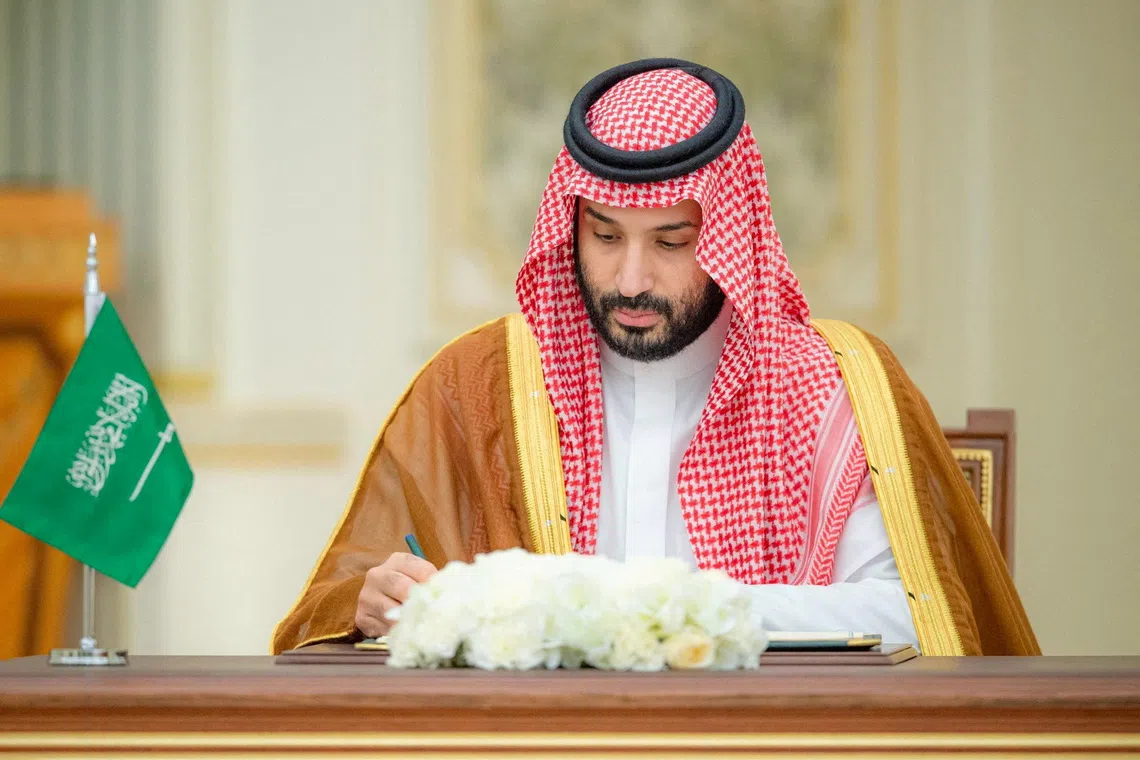From pariah to power player: Saudi’s MBS reclaims world stage in US visit
Sign up now: Get ST's newsletters delivered to your inbox

Saudi Crown Prince Mohammed bin Salman signs a defence agreement in Riyadh on Sept 17.
PHOTO: REUTERS
DUBAI - On his first White House visit since the killing of Saudi critic Jamal Khashoggi sparked global outrage, Crown Prince Mohammed bin Salman is on a mission to reclaim his place on the world stage and prove to US President Donald Trump that backing his forceful leadership was worth the gamble.
Nov 18’s meeting between Trump and Saudi Arabia’s de facto ruler - widely known as MbS - underscores a relationship built on strategic interests that have endured even as the uproar around the 2018 killing of Khashoggi, an insider-turned-critic, recedes into history.
Seven years on, MbS now casts himself as a broker of peace, repairing ties with Iran, pushing for a Gaza ceasefire and welcoming Syria back into the Arab fold, a striking pivot from a prince once branded reckless for plunging into Yemen’s war.
Both reformist and autocrat, MbS has emerged as the most momentous and audacious leader in the kingdom’s modern history - driving its transformation and shaping its future.
Prince swept away austere social codes, crushed dissent
At home, in less than a decade, the 40-year-old has unleashed a social revolution unseen since his grandfather, King Abdulaziz, forged the kingdom from desert tribes and sealed its fateful alliance with Washington.
The prince has defanged the once-feared religious police, sidelined clerics, and swept away decades of austere social codes. Women now drive, work and mingle freely with men -freedoms once punishable by flogging.
In a kingdom that once cloaked women in mandatory black abayas and hijabs, pop stars and fashion shows now light up Riyadh, recasting Saudi Arabia’s image from a cloistered theocracy into a nation hurtling toward modernity.
In scenes unimaginable just a few years ago, Jennifer Lopez and Camila Cabello electrified the Riyadh stage recently - Lopez in a glittering bodysuit, Cabello in a sheer gown - as Elie Saab models swept the catwalk before an audience that included Hollywood icons Halle Berry and Monica Bellucci.
But the same hand that opened Saudi society has tightened its grip on power. Dissent was crushed, critics silenced, and rival power centers locked up and dismantled.
The message is unmistakable: reform proceeds only on MbS’ terms - and loyalty to the crown prince is its price.
MBS’ arrival will be ‘pre-coronation moment, says analyst
Globally, the leader of the top oil exporter has emerged unbowed from Khashoggi’s murder by Saudi operatives - a killing US intelligence linked to him. He denied ordering it, but admitted responsibility as de facto ruler.
Then-presidential candidate Joe Biden said Saudi Arabia should be made a pariah because of the killing. But Washington ultimately moved on, driven by energy, defense and technology.
Mr Trump’s return to the White House in 2025 revived a transactional warmth: US$600 billion (S$781 billion) in Saudi investment pledges, effusive praise, and shared interest in a defence pact.
“Khashoggi is not all forgotten. But should the relationship between two important states be based solely on one incident, or do you have to take into account the greater interest of the United States or Saudi Arabia moving forward?” said Mr Douglas A. Silliman, president of the Arab Gulf States Institute in Washington.
When MbS lands in Washington, he will be greeted with the pomp typically reserved for a future monarch.
“This will be a pre-coronation (moment),” said Mr Steve Clemons, a Washington analyst, signaling that the kingdom’s future now belongs to its young prince.
Dr Paul Salem of the Middle East Institute noted that despite past crises - including the Sept 11, 2001 attacks, when 15 hijackers were Saudis - the US and Saudi Arabia remain bound by the same cold calculus that has defined their ties: shared interests in energy, defence, and now AI.
“AI is the oil of the 21st century, and America needs Gulf energy and capital,” said Dr Salem, adding that defence anchors the relationship, with the US providing security guarantees.
MBS’ face dominates media, malls, billboards
MbS’ rise marks a generational shift. He will be the first monarch descended from a grandson of the kingdom’s founder, King Abdulaziz, breaking with decades of tradition.
From the start, he framed his mission in bold terms: “Seventy percent of Saudis are under 30. We will not waste the next 30 years dealing with extremist ideas. We will destroy them today,” he declared in 2017 after becoming crown prince, vowing to restore a “moderate, balanced Islam” open to the world.
MbS’s rise began when his father, King Salman, ascended the throne in 2015 and gave him powerful portfolios including defense. In 2017, he ousted his older cousin Mohammed bin Nayef as heir in a palace coup, upending a hierarchy long governed by seniority. Saudi television showed MbS kissing Nayef’s hand, a choreographed gesture of unity masking a power grab.
His presence dominates public life: his photos are across malls, billboards and local media, every initiative cast as a masterstroke. Yet his methods remain opaque. Crackdowns have silenced debate over whether his economic ambitions can deliver.
Under MbS, Saudi Arabia has also stormed the global sports arena, merging the PIF-backed LIV Golf circuit with North America’s PGA Tour, luring soccer icons like Cristiano Ronaldo, and securing hosting rights for the 2029 Asian Winter Games and the 2034 FIFA World Cup. REUTERS


